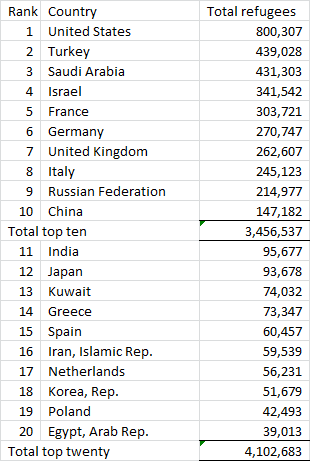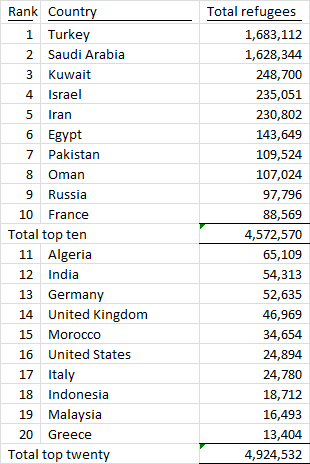I have spent time this summer helping refugees in Budapest and also got engaged in discussions with people about “what to do about the refugee problem”. In the press and on Facebook I came across many claims intended to support one view or another. I noticed that often the quality of argument is very poor. People often expressed views which were shot from the hip but then they could not support them with knowledge or evidence. Sometimes anecdote clashed with principle; sometimes reason battled with emotion. Sometimes quite intelligent and well-educated people said things a primary school kid could take to pieces. Other times people completely switched off their thinking brain and let the instinct brain babble away. Little progress was made.
I found myself agreeing and disagreeing with stuff on both sides – although again I didn’t have much to go on to agree with or disagree with, because I also didn’t have many facts at my finger tips. Like: do refugees really boost the economy? It sounds nice, but where was that, when did it happen? Or do refugees burden the economy? Which ones?
And then, do I care what the economic impact of accepting refugees is – does that really matter when we are dealing with people who are fleeing from really shit places. No-one is going to starve as a result of our GDP taking a hit because of the cost of being kind and letting in a million people. So get real. But that, too, is an unformed argument. Perhaps someone might starve. I don’t have any model or facts to support or counter that claim.
Do immigrants enrich our culture or undermine it? And then what do I mean by “our culture”? Is that the fact we play our football matches at 3pm on Saturday and have nice old churches? Is that all so important compared to questions of life and death? And what is this sudden interest in Christian culture? The churches still seem pretty empty to me, so I think this Christian culture might not be so Christian really, after all. And aren’t Christians supposed to love their neighbours and be good Samaritans (Luke 10: 25-37)? So how does that work? Is there like some limit to how Christian a good Christian should be in order to be a good Christian but not too good a Christian for his own good?
So I felt that the whole refugee question, being quite serious, deserves much, much more rigour. Look at all the science which goes into climate change – the immense cumulative effort of the IPCC, the work of thousands of scientists. Is as much rigour applied to making decisions about refugee policy?
I needed to start somewhere so I got a pencil and a piece of paper and started to list the claims made by each side. I wanted to build a catalogue of the arguments and see how they interlink, support or rebut each other. I wanted to see how each claim is supported by evidence and what is the source of that evidence. Or if a claim is supported by an assumption, how reasonable is that assumption and what is it based on.
Then, if one claim leads to another claim, what is the logical connection between the two, and how reasonable or robust is that connection.
But then the scope got a bit more ambitious. I also wanted to investigate the values which underpinned claims – when someone is worried about the impact on the Christian heritage of Europe, how Christian is that, and how does that work? Or if someone is dogmatic about letting everyone – yes everyone – into our country, what are the values underlying that and are they being applied consistently? And, what other claims do those values support? Do the same values support any claims on the other side?
I wanted to chase arguments to ground, to see where they lead to, rather than seeing them peter out as the thread changed tack.
I wanted to strip out the emotional and rhetorical content from each claim and shine a bright light on it so see its factual and logical content.
I wanted sift through this logical construct of claim, values, implications and supporting evidence, in order to search for common ground. If I could find claims on opposing sides which happen to have common ground, then there might be ways of developing policy proposals which can command broader support – providing they are communicated in the right way.
Well, all this became very ambitious, so I began to think about who might be interested in doing this, rather than thinking about how I can do it. I realised I don’t have a “model of political argument” or associated technology needed to do a proper mapping of the claims and related arguments. And I certainly don’t have the time to work on this.
So I conceived of a project which might be suitable for students of political science.
The project would list claims made on all sides of the debate (e.g. “Large influx of people will undermine our precious culture”) and map out all their features: assign to them the underlying value set they come from (e.g. settler, or Conservative); reference the supporting assumptions or evidence (e.g. such and such an academic study); cite the evidence which backs the assumptions; plot out the implications of the claim, i.e. generate new claims which are implied by each claim, and then subject the implied claims to the same analysis; link them to counter-claims – see how they match up; classify rhetorical attributes; evaluate any emotional but not reasonable attributes … thus create a complete map of the arguments.
The mapping would serve various uses:
(i) Analysing and evaluating political argument – how sound are the arguments; do they really stack up once you have stripped out the rhetoric; how right or consistent are they? Do they have any implications which don’t stack up?
(ii) Communicating clearly to the general public and interested users the validity of the argument and the conditions under which it is valid: it would be very useful to shine a bright and rigorous light onto the bullshit and scaremongering as well as onto the unquestioning hopefulness one can see in the debate.
(iii) Searching out potential for common ground: once you have stripped out the rhetoric and analysed rigorously each claim, you can see better the distance between claims on each side and possibly find common ground (simple example: one side says “they should go back to Syria”; another says “they should stay”: potential common ground is to say “they can stay until there have been two years of peace then they have to go back”)
(iv) Searching out for inconsistencies in positions
(iv) etc etc
Finally, I figured that if this kind of rigour could be applied to political argument generally, and communicated in a way that the general public can understand, we could bring about an improvement in political argument. We could also even move to properly working bullshit-meters or argument-o-meters which could be incorporated into FB pages, newspapers etc. Eventually woolly-thinking, bullshit and emotionally charged argument would be eliminated.
If you work in political science and think there is mileage in this, and it hasn’t been done, please run with it.






